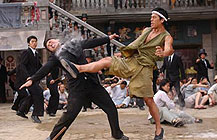|
|
|
|
Kung
Fu Hustle
|
 |
|
2005 was a terrific year for movies. At the close of December, films fans (depending on their global location) argued over whether it should be Million Dollar Baby (2004), The Big Red One (1980/2004), 2046 (2004) or Land of the Dead (2005) which deserved the top honours. But all these are, in a way, safe, predictable choices: tragic dramas, epic works by long-acclaimed auteurs or restored masterpieces will always be in line for a certificate of quality. However, the best commercial release of that year happens to be a comedy – a comedy so perfectly conceived and executed that it raises itself to the level of the sublime. Stephen Chow's Kung Fu Hustle (the Chinese title translates simply as Kung Fu) was not exactly a new film when it opened in Melbourne multiplexes; it played, to the devotees of this director-writer-star, in the city's Chinatown cinema for several months without a single notice appearing in the English-language mainstream press. But now that the film (which was post-produced in Victoria) has been launched to a wider audience, one can only hope it finds the market it deserves. Chow, like Jackie Chan, is already a superstar in Asia. I will risk the claim that he is a far more accomplished director than Chan, and that he goes to extremes that take him well beyond his predecessor. But, like Chan in recent years, Chow is now aiming squarely at the global audience – a campaign which did not quite succeed for his previous, wonderful film, Shaolin Soccer (2001). Kung Fu Hustle is a huge, expensive, intricate film – with, paradoxically, a very tight framework of narrative actions. It is also, as much as Tarantino's Kill Bill (2003/4), a patchwork of quotations, allusions and pastiches. Beyond the fleeting gags about Gladiator (2000) and The Shining (1980), Wong Kar-wai and Zhang Yimou, the central plot is woven from various milestones of Chinese martial arts cinema. So the Axe Gang that terrorises Shanghai in the 1940s is from Boxer from Shantung (1972), while the crowded, ravaged tenement of Pig Sty Alley recreates the setting of The House of 72 Tenants (1973). And some of the actors from those films also reappear here, such as Yuen Wah as the Landlord. Chow wisely delays his own entry into the story, as the craven, petty thief Sing, for maximum comic effect. And he delays Sing's passage from anti-heroism to heroism for a much longer period. Often, in fact, Sing is a mere observer of calamitous events – Chow giving the stage over to such remarkable performers in his ensemble as Yuen Qui who, as the Landlady, has a cigarette permanently dangling from her lips, even when she is flying through the air or unleashing awesome forces. As a filmmaker, Chow is a magical combination of Sergio Leone and Frank Tashlin. His feeling for what makes a gag cinematic, rather than purely theatrical, is peerless in contemporary cinema. Our laughter is generated as much by an unusual choice of camera angle, a sudden switch in musical cues, or the split-second pause before cutting to another shot, as by the pratfalls and action clinches that are so superbly choreographed by the best in the business, Yuen Woo Ping and Sammo Hung. In Hollywood's golden era, directors such as Leo McCarey and Blake Edwards used to define screen comedy as the process of 'topping the topper': finding ways to keep a gag going, each time making it bigger, cleverer and funnier. Chow takes this on board not only as a comic principle, but also a storytelling one. Kung Fu Hustle is an unbroken chain of toppers. In order to keep these toppers in reserve, the entire plot is a succession of surprises, twists and revelations. The way Chow unveils these key events, often with a sweeping camera movement, is magisterial. Chow's work both as director and actor has its origins in a Hong Kong tradition known as nonsense comedy. Such comedy does not travel terribly outside its homeland, since it relies heavily on a screwball linguistic wit, as well as a plethora of local pop culture references. Chow scarcely compromises his love of such nonsense here; indeed, he even manages to pull off what contemporary American comedies cannot: to simultaneously satirise his narrative premises as hopelessly cornball, and yet milk these corny conventions for all their emotional worth. The same canny, bold attitude extends to the film's extensive use of digital special effects. Chow does not try to compete with the Hollywood machine on the terrain of realism. He heads in the opposite direction, using digital trickery to create a type of animation (using live figures) that frequently recalls the most inspired inventions of cartoonists like Tex Avery and Chuck Jones. For those viewers new to Chow, unfamiliar with From Beijing With Love (1994), God of Cookery (1996) or even the proper version of Shaolin Soccer before it was tidied up by Miramax, Kung Fu Hustle may be a little shocking. The bodily humour in his work is extreme: characters are constantly spitting blood, getting their bones stomped to a pulp, or pulling knives out of their limbs. But that, too, is a sign of the delirious, truly surrealistic realm to which Chow allows us access: a poetic universe in which even the biggest loser can come back from the dead to top the topper. © Adrian Martin August 2005 |
![]()